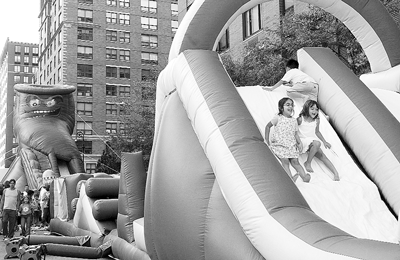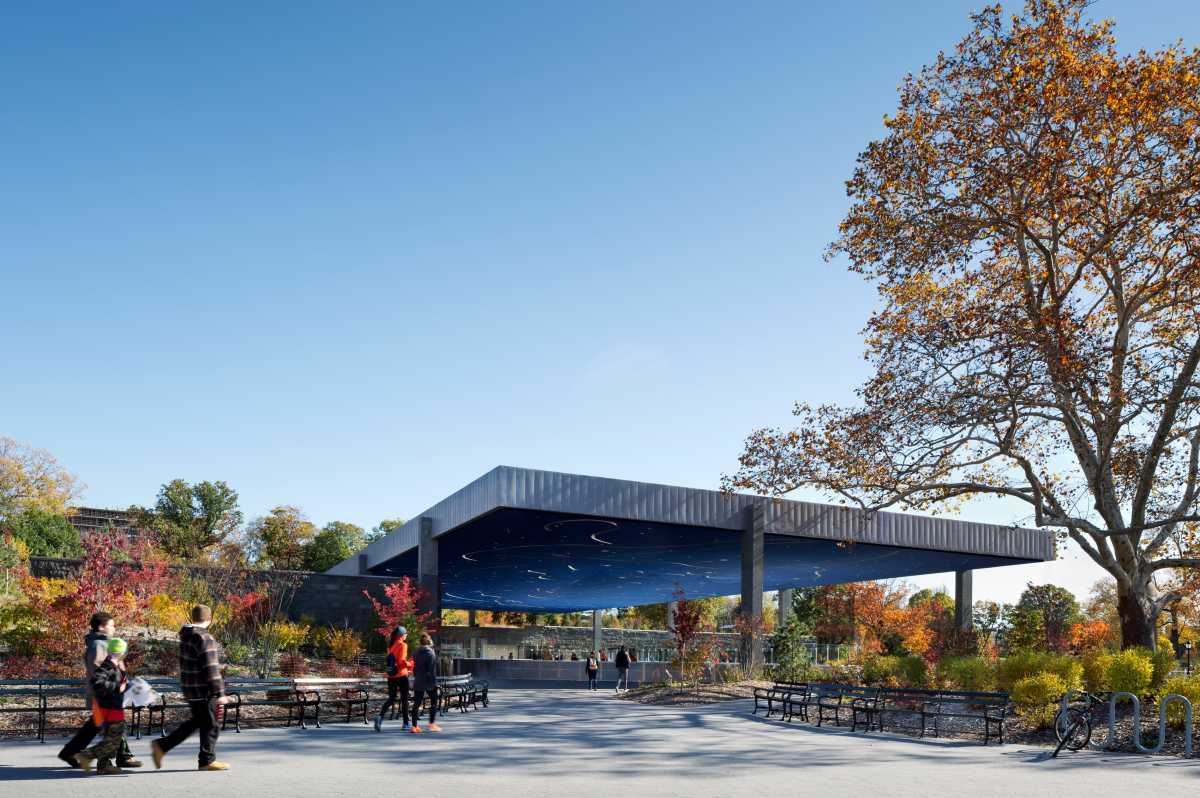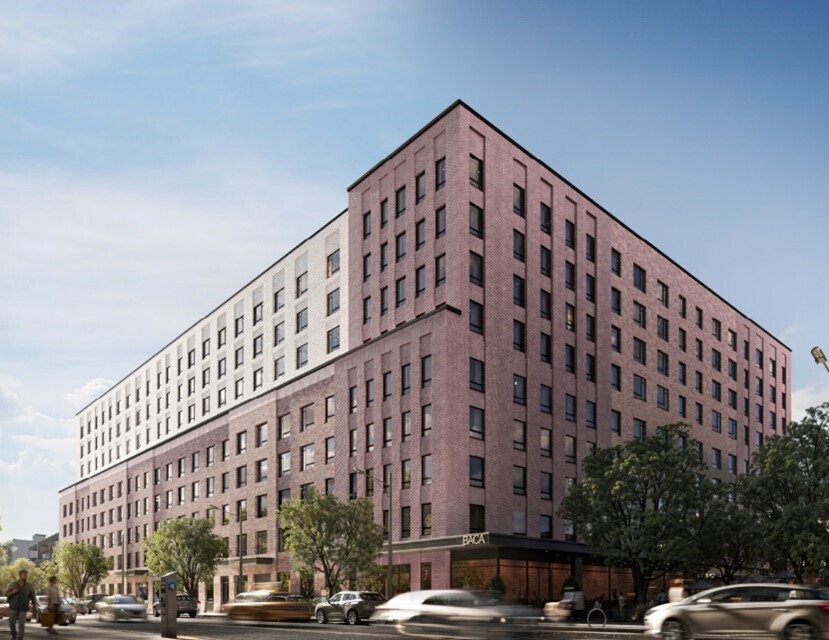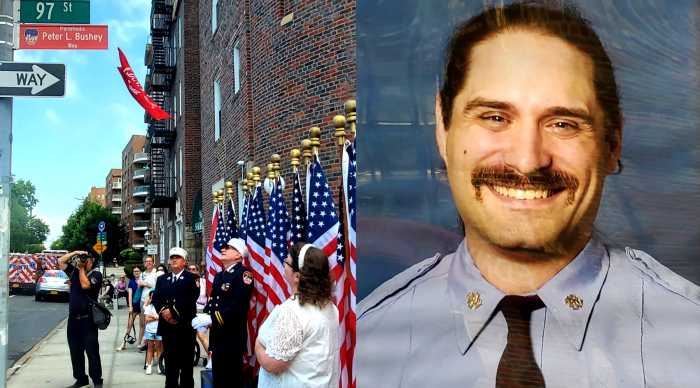By Ronda Kaysen
Sunday services at P.S./I.S. 89 raise questions
With strobe lights flashing, three zealous parishioners competed in a game of “who can hold a box over his head the longest” while a Christian rock band reminiscent of the not-so-Christian White Stripes blasted through a squeaky-clean version of the reggae classic, “I Can See Clearly Now” — in the auditorium of Public School 89.
The church, Mosaic Manhattan, has been able to hold its services at the Battery Park City public school for the past year and a half because of a 2002 court ruling against the Department of Education, which gave religious organizations the right to hold their worship services in the city’s numerous public buildings. But when Mosaic helped fund two P.S. 89 P.T.A. and one school event, some community members objected to the church’s generous financial donation; legal experts now wonder if this new law will further blur the boundary between the church and the state.
Battery Park City, with a large Catholic and Jewish population, is lacking in houses of worship — for all faiths. The 18-year-old Battery Park Synagogue, the only synagogue in the neighborhood, has its headquarters in Gateway Plaza, its High Holiday services are held at the Marriott Hotel in the World Financial Center, and other major events are held in various neighborhood facilities. St. Joseph’s Chapel, the only Catholic church in the neighborhood, is a small chapel also located at Gateway Plaza. Mosaic, a Southern Baptist-affiliated church is the only Protestant Church in Battery Park City.
A Parent and a Pastor
Farah is also a parent of three daughters, all of whom attend P.S. 89. “I’m surrounded by beautiful women,” he said. When his church contributed $5,000 to the P.T.A.’s 2003 Welcome Back to School party and distributed balloons emblazoned with Mosaic’s cross-embedded logo and church literature, some parents balked at what they saw as a violation of separation of church and state.
“I felt like I was in a new production of the ‘Stepford Wives,’” said Tom Goodkind, a Battery Park City resident and P.S. 89 parent, of the event. According to Goodkind, the balloons and flyers were distributed to the children with little fanfare. “It just didn’t seem appropriate for a religious group to be handing out these fliers with balloons and crucifixes in a school setting.” Although the event was not on school property — it was at Pier 25 — it was in fact sanctioned by the P.T.A.
The school and P.T.A. turned to the Dept. of Ed. for direction. “We were treating [Farah] like any sponsor in that we were giving him airtime,” said Pamela Tucker, fundraising chairperson for the P.S. 89 P.T.A. “It made many of the parents uncomfortable.” The Dept. of Ed., following the advice of its legal team, told the school that while it could accept donations from the church, Mosaic should not distribute its materials at any school event.
This September, Mosaic donated $2,500 to the Welcome Back to School party, which was held on school property, but agreed not to distribute balloons, literature or have a booth. The church was thanked in the party brochure, however, as were all contributing organizations. “[The concerned parents] have to understand the nature of the giving,” said Tucker. “It’s not to proselytize, it’s not to buy loyalty or to buy faith. It’s true altruism.”
For Ronnie Najjar, principal of P.S. 89, the issue involves not only a tenant of the building, but also an involved parent in the school. In attempting to address the anxieties of concerned parents while still respecting Farah’s desire to involve his parish with the school — and respect the court ruling that protects him — Najjar has had to tread lightly. “Some of the parents who are objecting [to the Back to School parties], object to using schools for places of worship and there’s something to that. I won’t say it’s an unfounded objection,” she said. “[But] Mosaic has a right to be in the school. I don’t have a course of action against giving somebody a permit for the use of our schools, unless the Dept. of Ed. says I can’t and they have not said that.”
Ellen Foote, principal of I.S. 89, sees the precarious nature of Najjar’s situation as inevitable once religious organizations begin holding regular services in a school. The lines between “Farah the parent” inevitably blur with “Farah the pastor” and “personnel has to be constantly vigilant that all requests are put through the appropriate channels,” according to Foote, in a way that personnel does not with less controversial groups, such as community groups. Farah has no children at I.S. 89, so Foote deals with him only as a tenant.
Because a religious organization has access to the school on first amendment grounds, school officials may fear a religious organization will take legal action if its request is not granted, for whatever reason. Since the 2002 court ruling, Foote said, several religious groups have approached her seeking to rent its space and a Jewish group was angry when it was denied a permit.
Foote also worries that at some point a school-sanctioned activity, such as a weekend study group, will coincide with a religious service in nearby classroom, a situation she thinks might influence non-church going children, making it difficult to distinguish between the school-sponsored and church-sponsored activities. “I can’t think of any other type of activity that we would permit in the school that would give rise to that kind of concern,” said Foote.
For some skeptical parents, Mosaic’s new low profile at P.T.A. events does not relieve their anxiety about the church’s level of influence on their children. “For those of us who don’t happen to be Protestant, which is probably the majority of us, to have a Southern Baptist group with that kind of presence is tasteless,” said Goodkind.
Some legal and religious analysts agree with Goodkind’s concern, arguing that the very presence of the church in the school can lead to an uncomfortable relationship between school and religious officials. “If you can’t tell the difference between the church doing a good thing for the school and a parent doing a good thing for the school then you have a problem,” said Reverend W. Fredrick Wooden, senior minister at First Unitarian Congregational Church in Brooklyn. When told of Mosaic’s involvement in school events, Wooden said it would be hard to separate Gregg Farah the pastor from Gregg Farah the parent. “The power of religion is so strong that we need to be more transparent and more vigilant about that than other forms of power. When the church and the state come close, it becomes ever more important to maintain the transparency of who is speaking for whom so the people who are affected can go either to the state or the church and ask them to give account.” Because Farah is a parent and his parish is in the school, Wooden suggested his church not participate in school activities to assure the distinction between the two remains clear.
Some church members, in fact, have encountered skepticism from Mosaic-wary P.S. 89 parents when participating in school events. When Katie Ferdinand, a P.S. 89 parent and Mosaic member, agreed to direct the school’s talent show last year, Mosaic reached out to her and offered to supply the sound system and loaded it for the event — which took place in the school auditorium. When Ferdinand received a phone call from a suspicious parent, she was taken aback. “So I go to that church,” said Ferdinand, a former stage director. “I’m hosting the talent show, I will not be handing out bibles at the talent show.”
Beth Haroules, a staff attorney for the New York Civil Liberties Union holds the school — not the church — accountable for maintaining a clear boundary between church and state. Although she was not familiar with the particulars of Mosaic, she voiced concern about church-sponsored P.T.A. events. “The school has started down this dangerous path that looks to be the school endorsing this religious message,” she said. “The church has the right to engage in proselytizing, but the school should not be allowing them to have access to a school-sponsored event.” The banners hanging from the school’s playground fence on Sunday mornings was also worrisome, she said, because they too suggested an endorsement from the school.
Regardless of where Mosaic holds its Sunday services, the P.T.A. needs money to fund its events and, according to Tucker, Mosaic is a significant — and important — donor. It is the only religious organization, in fact, that gave money for this year’s P.T.A. event. “It’s hard to get money for the school,” she said. “[Farah] has been a good and consistent option.” If fundraising were less of a challenge, added Tucker, she would rather not take money from any religious organization because of the “contentious” nature of the issue.
Court Ruling
To a certain extent, school officials have their hands tied. The 2002 preliminary injunction against the Dept. of Ed., upheld last June by the Second Circuit Court of Appeals, mandates that if New York City public schools are renting out their space, they must not exclude houses of worship on the basis that the groups are religious by nature. “The school board is taking a very dangerous position in saying that religious groups can be excluded simply to show that the government is impartial,” said Jordan Lorence, the attorney for the Alliance Defense Fund, a legal organization for religious freedom. “An individual expressing a religious opinion is not a government endorsement of religion.” A.D.F. is the legal team defending the plaintiff in the case against the Dept. of Ed., Bronx Household of Faith. According to Lisa Grumet, counsel for the Dept. of Ed., the case will return to a lower federal court this January for trial.
“Our system of education was not designed to be supported by churches,” said Susan Jacoby, author of “Freethinkers: A History of American Secularism” (Metropolitan Books, 2004) and director of Center for Inquiry-Metro New York, a secular think tank based in Massachusetts. “Public officials should not be in the business of judging which religions to have on their public premises and which not to.”
For Farah, the issue of using a school auditorium for his services is pure economics. When he went looking for affordable space in the neighborhood — he lives in Gateway Plaza — he found few options. The United Artists movie theater demanded early hours and the hotel lobbies were too costly at $1,500 per rental. So he looked to his daughters’ school, P.S. 89, where he could rent the auditorium and cafeteria for $300 per morning. Mosaic’s operating budget for 2004 is $588,504, according to Farah. With two services a week (one on Sunday mornings and one in the evenings), the church now pays the Dept. of Ed. about $30,000 a year in rent, a fraction of what it would pay to rent a hotel or corporate conference room every week.
“Manhattan is an expensive place to buy a building, temporary spaces are even more expensive,” said Lorence of A.D.F. “This is a temporary measure to meet the needs of a growing church that is too big to meet in somebody’s house but hasn’t been around long enough to raise their own money.” Denying churches access to schools, says Lorence, denies them equal access to public space, in effect, disenfranchising fledgling churches like Mosaic.
State Assemblymember Deborah Glick, however, argues that cost and lack of space has little to do with the A.D.F.’s efforts to open schools to religious organizations. “This is an effort on the part of ultra conservative legal organizations specifically intending to blur that distinction” between church and state, she said.
Some P.S. 89 parents approached Glick following the 2003 party, Glick said. Since the issue was addressed by the Dept. of Ed. and the court ruling is facing an appeal, Glick has taken no action regarding the matter. Nevertheless, the presence of a church in one of her district’s public schools makes her uncomfortable. “Churches are tax exempt institutions. It is not as if there is no vehicle or no other alternative location for churches,” she said.
A Church Blossoms Downtown
Since its March 2003 inception, Farah’s parish has been a model of what can be achieved when a church is committed to its community, according to the planting organizations that back it. “It takes a lot of guts to start something new in an area that hasn’t seen something like that take place,” said Dr. Mark Reynolds, assistant director of church planting for Redeemer Presbyterian Church, one of Mosaic’s financial backers. “[Mosaic] has shown that they are servants to the community. They are not using the community for their own agenda.”
“They’re really sincere, good honest, phenomenal people,” Ferdinand, a Mosaic member, said of Farah and his wife, Janine. When she and her family moved from their Tribeca apartment to Gateway Plaza, the Farahs lent her a van. “That’s the kind of people they are,” she said.
Ferdinand was skeptical of Mosaic’s methods at first. A year and a half ago, a church member approached her while she was sitting with her two small sons in Washington Market Park and said, “I’m from Mosaic and I’m on a mission from God” while other members distributed small windup toys to the children. “It kind of creeped me out,” she said. “The technique might work in other areas, but here in New York, it’s just different.” When the church later sent her a flyer, she was willing to give them a second chance, returning to church for the first time since she was 18.
Farah, she says, has changed his methods over time to better meet the community’s expectations. “Gregg made a mistake,” she said of the 2003 back to school party. His new, lower profile, approach is much less offensive to wary New Yorkers, she said.
Howard of New Hope New York, who splits his time between New Hope’s offices and the North American Mission Board’s Atlanta offices, attends Mosaic whenever he is in New York. Schools, he says, make excellent houses of worship. “Schools are ideally suited for churches in that schools aren’t doing anything on the weekends,” he said. “The facilities themselves are good for us.” In addition to launching new churches, New Hope has a substantial charitable works program. Last summer, its volunteers and the Anti Defamation League helped paint M.S. 80 in the Bronx.
Last school year and summer, more than 15 religious organizations took advantage of the new court ordered policy and were granted permits by the Dept. of Ed. to hold Sunday services or meetings in public school buildings, according to Grumet, the lawyer for the Dept. of Ed. Of the 20 churches that New Hope helped launch, at least three hold their services in public schools.
Mosaic, now in its second year, is large enough to help launch two new churches — one in the East Village and the other in New Jersey — as it works to fulfill its mission to provide evangelical churches for the greater New York City area. Mosaic’s New Jersey offspring, Harbor View, began holding its services two weeks ago at Wallace Primary School — a public school in Hoboken.
WWW Downtown Express
Read More: https://www.amny.com/news/all-we-need-to-know-is-taught-in-first-grade/



































